Articles 29 and 30 of the Indian Constitution protect the rights of minorities in education. Article 29 ensures that minority groups can preserve their language, script, and culture while Article 30 grants them the right to establish and manage their own educational institutions. These provisions aim to support cultural diversity and prevent discrimination in educational settings.
Article 29: Protection Of Interests Of Minorities
Article 29(1): Any section of the citizens residing in the territory of India or any part thereof having a distinct language, script or culture of its own shall have the right to conserve the same
- Article 29(2): No citizen shall be denied admission into any educational institution maintained by the State or receiving aid out of State funds on grounds only of religion, race, caste, language or any of them.
- This provision falls under the umbrella of cultural and educational rights and serves to safeguard the rich diversity of India.
- Collective vs. Individual Rights: The first provision safeguards the collective rights of a community, whereas the subsequent clause upholds the individual rights of a citizen, independent of their community affiliation.
Enroll now for UPSC Online Course
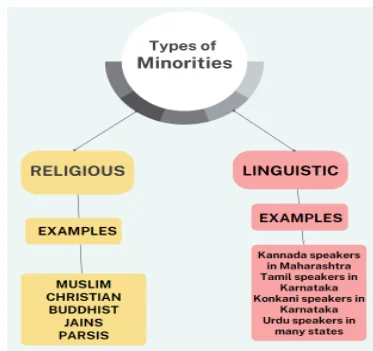
- Protection for Religious and Linguistic Minorities: Article 29 grants protection to both religious minorities as well as linguistic minorities.
- Legal Recognition of “Minority”: The word ‘minority’ has not been defined in the constitution.
- Section 2(c) of the National Commission for Minorities Act, 1992, defines a “minority” for the purposes of the Act.
- According to this section, “minority”, for the purposes of the Act, means a community notified as such by the Central government.
- Authority to Recognize Minorities: This provision empowers the Central Government of India to recognize communities as minorities within the legal framework of the Act.
- Based on this provision, the communities recognized as minorities in India are Muslims, Christians, Sikhs, Buddhists, Parsis (Zoroastrians), and Jains. These communities are recognized for the purpose of ensuring their rights and protections as stipulated under the Act and the provisions of the Indian Constitution.
- Section 2(c) of the National Commission for Minorities Act, 1992, defines a “minority” for the purposes of the Act.
- Ashwini Upadhyay v. Union of India (2019): Ashwini Kumar Upadhyay challenged the section 2(c) of the National Commission of Minority Act,1992 which gives unbridled power to the Centre to declare any community minority arbitrarily.
- Article 29(2): is a protective clause that ensures non-discrimination in educational opportunities provided by the State.
- It stipulates that no citizen shall be refused entry into any educational institution that is either operated by the State or receives financial aid from State funds, based solely on considerations of religion, race, caste, language, or any combination thereof.
Article 30: Right Of Minorities To Establish And Administer Educational Institutions
Article 30 of the Indian Constitution enshrines the right of minorities to establish and manage educational institutions.
- This provision is a cornerstone in India’s educational and cultural pluralism architecture.
- Article 30 provides rights to minorities both religious and linguistic:
- Right to Establish and Administer Educational Institutions: All minority groups are entitled to the right to establish and administer educational institutions according to their choice.
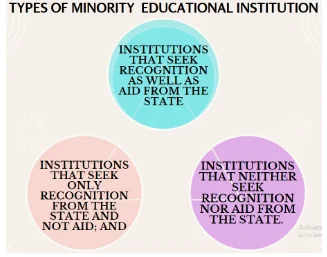
- Compensation for Property Acquisition: The compensation amount fixed by the State for the mandatory acquisition of property from a minority educational institution shall not restrict or abrogate the right guaranteed to them.
- This protection was added by the 44th Amendment Act of 1978, which also removed the right to property as a Fundamental Right from Article 31.
- Non-Discrimination in Educational Aid: The state shall not discriminate against any educational institution in granting aid.
- Protection for Minorities: Therefore, protection under Article 30 is granted to minorities (religious or linguistic) only and not to any other section of citizens.
- Minority Language Education Rights: The right under Article 30 also includes the right of a minority to impart education to its children in its own language.
- State Regulation of Recognized and Aided Institutions: The institutions that seek recognition as well as aid from the State and institutions that seek only recognition from the State and not aid, fall under the state’s regulatory jurisdiction concerning curriculum setting, academic criteria, discipline, sanitation, employment of teaching staff and so on.
- Autonomy of Unrecognized and Un-aided Institutions: The institutions that neither seek recognition nor aid from the State retain autonomy over their internal management but are subject to enforcement of general laws such as those pertaining to contracts, labor, industry, taxation, economic oversight, and the like.
TMA Pai Foundation v/s State of Karnataka, 2002
- Scope of Minority Rights in Education: This case dealt with the extent of the right of minorities to establish and administer educational institutions and the regulations that the state can impose on such institutions.
- Supreme Court Judgement on Article 30(1): Under this case the Supreme Court gave the judgement that:
- The right under Article 30(1) cannot be such as to override the national interest or
- to prevent the government from framing regulations in that behalf and any regulation framed in national interest must necessarily apply to all educational institutions, whether run by the majority or the minority.
- Impact on India’s Educational Landscape: This judgment has had a profound impact on the educational landscape in India, particularly in terms of the administration of minority institutions and the balance of rights between these institutions and the regulatory authority of the state.
Secretary of Malankara Syrian Catholic College case (2007): Supreme Court Guidelines for Minority Educational Institutions
- Right to Establish and Manage: Minorities have the right to found and manage educational institutions as per their choice.
- Equality with the Majority: The rights granted to minorities by Article 30 aim to achieve equality with the majority and not to give minorities a superior position compared to the majority.
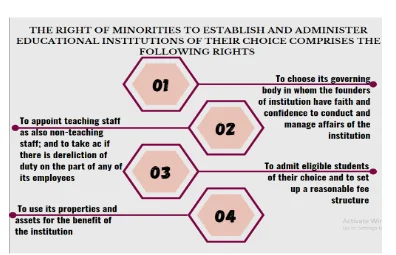
-
- There is no preferential treatment for minorities.
- Laws concerning national interests, security, social welfare, public order, morality, health, sanitation, and taxation, which apply to everyone, are also applicable to minority institutions.
- Limitations on Administration: The right to establish and manage educational institutions has limitations; it does not extend to poor administration. Although:
- Ensuring Educational Integrity: Regulatory measures are allowed to ensure educational integrity and uphold standards of excellence.
- Efficient and Effective Management: Oversight is necessary to guarantee efficient and effective management that aligns with the educational requirements of the institution.
- Welfare of Students and Teachers: State regulations can address the welfare of students and teachers, including establishing criteria for staff eligibility and qualifications.
- Employment Conditions: Employment conditions for both teaching and non-teaching staff are subject to regulation to protect against exploitation or abuse.
- Curriculum Guidelines: The State may set syllabus and curriculum guidelines, which are considered to be within regulatory norms.
- Non-Infringement of Rights: Such regulatory measures are not considered an infringement on the rights provided by Article 30(1).
- Provided they meet the criteria or qualifications set by the State, unaided minority educational institutions are free to choose their teachers/lecturers through any reasonable selection process.
- State Aid and Minority Institutions’ Rights: The provision of financial assistance by the State does not change the fundamental identity and purpose of minority educational institutions.
- The State may set terms to guarantee the correct use of this aid but must do so without diminishing or compromising the rights established under Article 30(1).
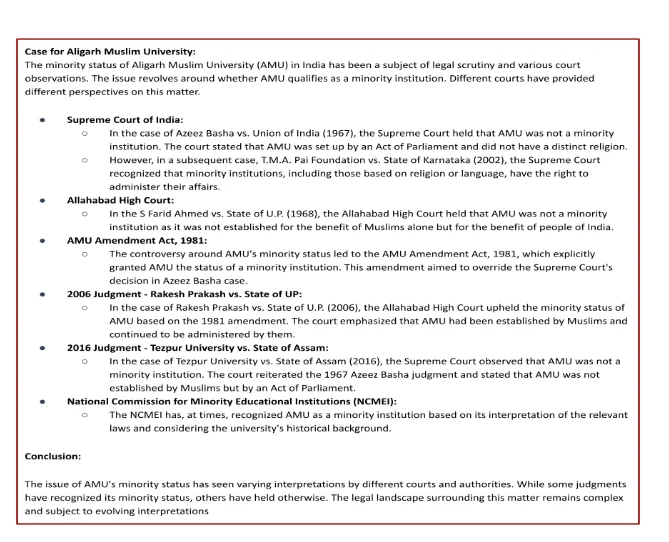
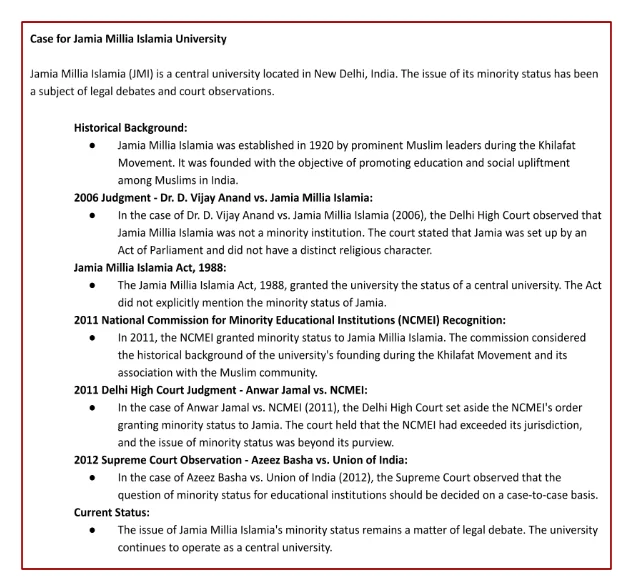
Enroll now for UPSC Online Course
| Must Read | |
| Current Affairs | Editorial Analysis |
| Upsc Notes | Upsc Blogs |
| NCERT Notes | Free Main Answer Writing |
Conclusion
In summary, Articles 29 and 30 uphold the rights of minorities to maintain their cultural heritage and educational autonomy.
- While ensuring non-discrimination and equal opportunities in state-funded institutions, these articles balance minority rights with the state’s regulatory role. This legal framework reinforces India’s commitment to pluralism and educational equity.
Sign up for the PWOnlyIAS Online Course by Physics Wallah and start your journey to IAS success today!
| Related Articles | |
| CULTURAL AND EDUCATIONAL RIGHTS: ARTICLE 29-30 | National Commission For Minorities |
| Taxation Systems in India: Classification & Types | Supreme Court of India |

 GS Foundation
GS Foundation Optional Course
Optional Course Combo Courses
Combo Courses Degree Program
Degree Program










